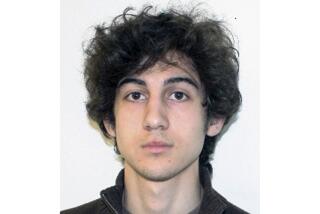Legal options were few in handling of Boston bombing suspect
- Share via
WASHINGTON — The federal rules say a person making an arrest “must take the defendant before a magistrate without unnecessary delay.” And the Supreme Court has said the judicial process must begin within 48 hours. This rule aims to “prevent secret detention,” wrote former Justice David H. Souter, adding that “no one with any smattering of the history of 20th-Century dictatorships needs a lecture on the subject.”
Despite criticism from Republicans and Democrats on Capitol Hill that the questioning of Boston Marathon bombing suspect Dzhokhar Tsarnaev was prematurely curtailed, legal experts say the only way to have avoided triggering that process once he was arrested a week ago would have been to declare him an enemy combatant. But many experts doubt the courts would permit secret detention of a suspect who is a U.S. citizen and was taken into custody in connection to a crime on American soil.
“All of this was done pursuant to standard court procedure,” said an Obama administration law enforcement official, who said that the administration believed it had little choice but to charge Tsarnaev, despite the considerable risk that he would stop talking and the frustration of a special team of federal agents who wanted to keep questioning him.
The time for questioning the 19-year-old suspect ended when federal Magistrate Judge Marianne B. Bowler came to his hospital room Monday, read him his rights and appointed a lawyer. He had been arrested April 19, and charges were filed and signed by the judge Sunday evening, within the 48-hour period.
Overnight Thursday, U.S. marshals moved Tsarnaev from the Beth Israel Deaconess Medical Center in Boston, where he was being treated for four bullet wounds, to a medical facility for federal prisoners at Ft. Devens, Mass. The prison, just west of Boston, is a special facility for injured or ill inmates needing long-term care.
During the weekend, agents had as many as 16 hours to question Tsarnaev about the bombing plot. Contrary to what many believe, the Miranda decision does not require investigators to warn a suspect of his rights before they question him. Instead, it says that a suspect’s incriminating statements cannot be used against him at trial unless he was warned of his right to remain silent.
In Tsarnaev’s case, investigators apparently had ample evidence, including surveillance cameras, that could be used to convict him. They probably did not need him to admit his guilt during an interview. Instead, they were eager to obtain information about the plot.
“First and foremost, your priority is to stop other threats and protect the public,” said Michael Rosensaft, a former federal prosecutor in New York. “After that, you can focus on the prosecution.”
A series of Supreme Court decisions going back to 1984 establishes the so-called public safety exception to the Miranda rule, which allows the option of questioning the suspect without warning him of his rights, hoping to gather information on the plot.
“There is no constitutional requirement that Miranda warnings must be given upon arrest,” said Steven Benjamin, a Virginia attorney and president of the National Assn. of Criminal Defense Attorneys.
“The constitutional rule goes to admissibility,” he said. If the questioning does not qualify as a public safety emergency, a defendant’s statements may be not be admitted as evidence if he had not been warned of his right to remain silent.
Charles Weisselberg, a UC Berkeley law professor, said the Miranda decision stands mostly as a symbol for legal rights.
“Miranda provides very little protection for suspects,” he said. “But it has become shorthand for saying: Are we going to treat him with the rights that we give people in the United States, or is he going to be treated as an enemy combatant with no rights?”
On Capitol Hill, critics of the administration say Tsarnaev should have been held as an enemy combatant and removed from the criminal justice system.
“We need to know about any possible future attacks which could take additional American lives,” said Sen. Lindsey Graham (R-S.C.). “The least of our worries is a criminal trial which will likely be held years from now.”
But terrorism cases since the Sept. 11, 2001, attacks make it appear doubtful that the Supreme Court would approve such a move, many legal scholars believe.
david.savage@latimes
More to Read
Sign up for Essential California
The most important California stories and recommendations in your inbox every morning.
You may occasionally receive promotional content from the Los Angeles Times.















